CORPORATE ACTION: Coca-Cola
Coca-Cola Launches Returnable Glass Bottles In France
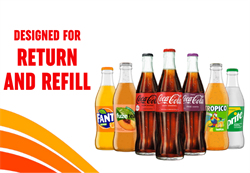
Coca-Cola in France has launched a 250ml returnable glass bottle for its beverage brands, including Fuze Tea, Tropico, Sprite, and Fanta. The returnable glass bottle can be refilled up to 25 times and will help retailers and wholesalers in managing bottle returns. Also, it will help the company save more than 15 million single-use glass bottles in 2022.[Image Credit: © Coca-Cola Company]
Coca-Cola Adds Refillable Glass Bottles To Inflation-Fighting Arsenal
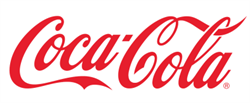 Coca-Cola Co. announced plans to expand distribution of refillable or returnable glass bottles in emerging markets in Latin America and Africa. The company said it is making the move to deal with a projected decline in consumer purchasing power due to inflation. Coca-Cola also said it is testing the market for returnable bottles in US Southwest.[Image Credit: © Coca-Cola Co. ]
Coca-Cola Co. announced plans to expand distribution of refillable or returnable glass bottles in emerging markets in Latin America and Africa. The company said it is making the move to deal with a projected decline in consumer purchasing power due to inflation. Coca-Cola also said it is testing the market for returnable bottles in US Southwest.[Image Credit: © Coca-Cola Co. ]
CORPORATE ACTION: Colgate
Colgate-Palmolive Joins Forces With Walmart To Promote Recyclable Toothpaste Tube
 Colgate-Palmolive is working with Walmart to promote the company’s recyclable toothpaste tube made from High Density Polyethylene (HDPE), the same plastic used for milk and detergent bottles. Also, Colgate created limited-run toothpaste tubes with “Recycle Me!” graphics and it’s sending its Bright Smiles, Bright Futures mobile dental clinics to some Walmart stores to offer free dental check-ups for children.[Image Credit: © Colgate-Palmolive]
Colgate-Palmolive is working with Walmart to promote the company’s recyclable toothpaste tube made from High Density Polyethylene (HDPE), the same plastic used for milk and detergent bottles. Also, Colgate created limited-run toothpaste tubes with “Recycle Me!” graphics and it’s sending its Bright Smiles, Bright Futures mobile dental clinics to some Walmart stores to offer free dental check-ups for children.[Image Credit: © Colgate-Palmolive]
CORPORATE ACTION: Danone
Loop Industries Secures Contract To Supply Danone With Recycled PET Resin
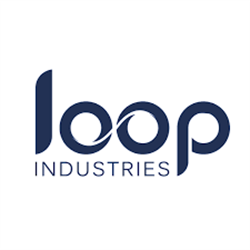
Loop Industries, Inc., said it has entered into a multi-year agreement to supply French food conglomerate Danone SA with Loop-branded 100 percent recycled polyethylene terephthalate (PET) resin. Loop will produce the recycled PET resin at the proposed Infinite Loop Bécancour facility, which is expected to start operating in the fourth quarter of 2024. Danone and other Loop partners assigned an internationally recognized third-party engineering firm to independently validate the “quality, effectiveness, and scalability” of Loop Industries’ technology.[Image Credit: © Loop Industries]
CORPORATE ACTION: Johnson & Johnson
Johnson’s Baby Launches Refill Cartons For Baby Care Bottles In UK
CORPORATE ACTION: Kraft Heinz
Kraft Heinz Works With Pulpex To Make Environment-Friendly Paper-Based Bottle
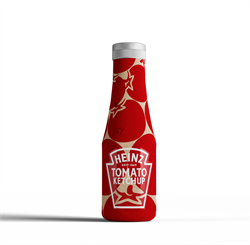
Kraft Heinz is collaborating with Pulpex to develop a paper-based bottle made from 100 percent sustainably sourced wood pulp. The proposed bottle will also be renewable and recyclable, the company said. Kraft Heinz said the collaboration is part of its efforts to make all its packaging recyclable, reusable, or compostable by 2025.[Image Credit: © Kraft Heinz ]
CORPORATE ACTION: L’Oréal
L’Oréal, Albéa Develop Sustainable Packaging For No-Rinse Conditioner
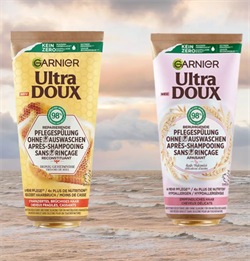
L’Oréal has partnered with Albéa to develop packaging for the Garnier No-Rinse Conditioner. Albéa combines its cardboard-based tube with the EcoFusionTop single-component open-and-close system to provide the 98% natural-origin product with a sustainable and recyclable packaging. The EcoFusionTop is 80% lighter than standard head and cap systems.[Image Credit: © L’Oréal and Albéa]
CORPORATE ACTION: Unilever
Unilever Partners With Global Alliance Africa To Launch Search For Sustainability Ideas
CORPORATE ACTION: Other
Coca-Cola, Suntory Announce 100% Plant-Based Bottle Prototypes
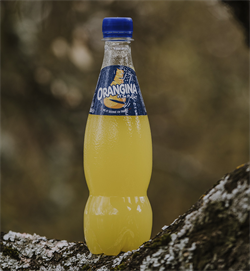
Beverage brands Coca-Cola and Suntory have introduced their respective 100% plant-based PET bottle prototypes. Both companies found it easier to develop a bio-based replacement for mono-ethylene glycol (MEG) than to create a plant-based alternative for terephthalic acid (PTA). MEG and PTA are the molecules that make up PET. Suntory collaborated with Anellotech in developing its plant-based bottle.
[Image Credit: © Suntory ]
CAMPAIGNS, COMMITMENTS & NGOs
Big Plastic Count Survey Aims To Measure UK’s Plastic Packaging Waste And Recycling
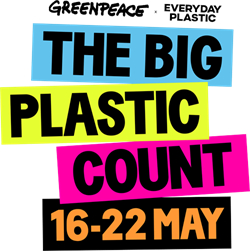
The environmental group Greenpeace and non-profit organization Everyday Plastic have launched the Big Plastic Count initiative aimed at determining how much plastic waste is produced by households in the UK. The survey is running between 16th and 22nd of May and is expected to cover individuals, families, schools, businesses, and community groups. Survey results will help determine how much plastic packaging is sent to landfill and how much goes to recycling facilities.[Image Credit: © The Big Plastic Count (Greenpeace)]
Extremely Low Recycling Rates In US Highlight Need For Credible Solutions To Plastic Pollution
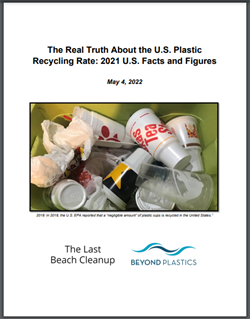
In 2021, the US recycled only 5–6 percent of its total plastic production and use. This shows that plastic recycling is not a “credible solution to plastic waste and pollution”. Other data prove that recycling cannot solve this problem, including the 263 percent increase in plastic waste generation from 60 pounds per person per year in 1980 to 218 pounds in 2018; no plastic food packaging items have been classified as recyclable according to the FTC Green Guide legal definition; and the growth in virgin plastic production keeps prices for high-quality new plastics lower than prices of recycled plastic.[Image Credit: © Beyond Plastics]
CONSUMER & PUBLIC OPINION
Report Shows 70% Of Consumers Prefer To Buy Products With Clear Recycling Information
 Research by Productsup and Censuswide revealed that seven in 10 consumers are “likely to buy” a product if information about recycling is visible. Results of the survey of almost 5,700 consumers, 16 years and older, across Europe and the US also showed that 34 percent think brands fail to provide clear information about recycling. Details of the report also showed that “supporting causes in line with sustainability labels”, collaborating with non-government organizations, and positive media reports about ethical practices are the least effective ways to position brands as pro-sustainability.[Image Credit: © Timon Studler]
Research by Productsup and Censuswide revealed that seven in 10 consumers are “likely to buy” a product if information about recycling is visible. Results of the survey of almost 5,700 consumers, 16 years and older, across Europe and the US also showed that 34 percent think brands fail to provide clear information about recycling. Details of the report also showed that “supporting causes in line with sustainability labels”, collaborating with non-government organizations, and positive media reports about ethical practices are the least effective ways to position brands as pro-sustainability.[Image Credit: © Timon Studler]
MARKET NEWS
UK Household Recycling Rates Drop In 2020
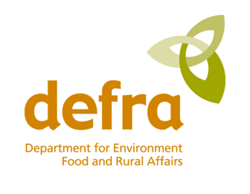
Household recycling rates in the UK dropped from 46.0 percent in 2019 to 44.4 percent in 2020, according to the Department for Environment, Food and Rural Affairs (Defra). Data from Defra revealed that household recycling rates declined in all countries except Wales. Biodegradable municipal waste sent to landfill fell from about 6.6 million tonnes in 2019 to around 6.1 million tonnes in 2020.[Image Credit: © DEFRA]
POLICY, REGULATION & LEGAL
EU Needs To Up Recycling Rates, Cut Waste Generation To Reach 2030 Target
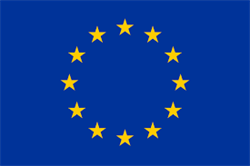 The European Union Member States need to increase their recycling rates for municipal waste and reduce their waste generation levels to reach their 2030 target of cutting residual waste by half. Results of the European Environment Agency’s analysis, “Reaching 2030’s residual municipal waste target — why recycling is not enough,” revealed that even if EU countries reach their required 60% recycling target, residual municipal waste is likely to be over 80 million tons in 2030, missing the target by more than 23 million tons. EU countries need to recycle about 72% of waste or reduce waste generated by a third and recycle 60% of municipal waste to reach their 2030 target.[Image Credit: © European Union]
The European Union Member States need to increase their recycling rates for municipal waste and reduce their waste generation levels to reach their 2030 target of cutting residual waste by half. Results of the European Environment Agency’s analysis, “Reaching 2030’s residual municipal waste target — why recycling is not enough,” revealed that even if EU countries reach their required 60% recycling target, residual municipal waste is likely to be over 80 million tons in 2030, missing the target by more than 23 million tons. EU countries need to recycle about 72% of waste or reduce waste generated by a third and recycle 60% of municipal waste to reach their 2030 target.[Image Credit: © European Union]
RESEARCH
Chemists Develop MOF Catalyst For Quick Recycling Of Plastic Waste
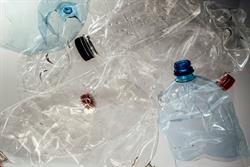
Chemists from the Northwestern University have demonstrated that a metal-organic framework (MOF) can act as a stable catalyst for analysis of polyester-based plastic into terephthalic acid, a chemical used in manufacturing. The team said the novel recycling method only requires plastic waste, hydrogen, and the MOF catalyst.[Image Credit: © Teslariu Mihai ]
Texas Scientists Develop Enzyme That Speeds Up Breakdown Of Plastic
 Researchers at the University of Texas at Austin have created an enzyme variant called FAST-PETase (functional, active, stable and tolerant PETase) that can split plastics into smaller parts and then put them back together through a chemical process. The study published in Nature science journal highlights the enzyme’s potential to speed up plastic recycling and significantly reduce plastic pollution. Cockrell School of Engineering and College of Natural Sciences researchers used a machine learning model to come up with novel mutations to a natural enzyme called PETase that lets bacteria decompose PET plastics.[Image Credit: © University of Texas]
Researchers at the University of Texas at Austin have created an enzyme variant called FAST-PETase (functional, active, stable and tolerant PETase) that can split plastics into smaller parts and then put them back together through a chemical process. The study published in Nature science journal highlights the enzyme’s potential to speed up plastic recycling and significantly reduce plastic pollution. Cockrell School of Engineering and College of Natural Sciences researchers used a machine learning model to come up with novel mutations to a natural enzyme called PETase that lets bacteria decompose PET plastics.[Image Credit: © University of Texas]
Copyright 2026 Business360, Inc.

